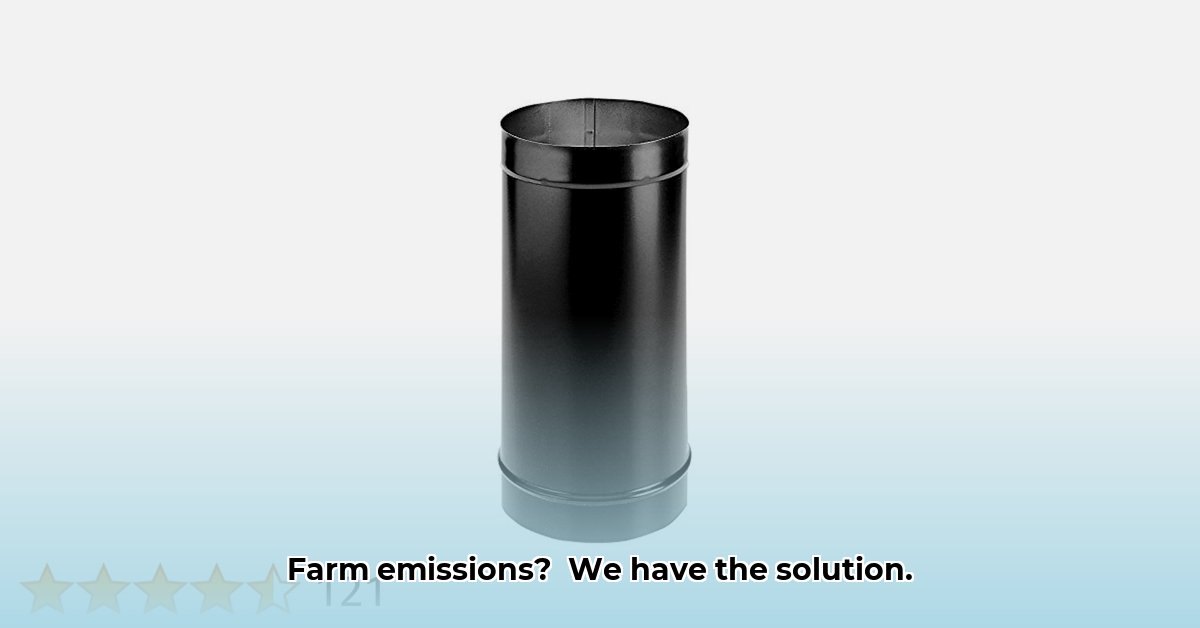
Stove Pipe Tractor Supply: Heating Up Sustainability on the Farm
Farming is demanding, with long hours, unpredictable weather, and tight margins. But what if we could make farming both more sustainable and profitable? A major opportunity lies in optimizing farm heating, a significant energy consumer often overlooked. Stove Pipe Tractor Supply is uniquely positioned to help farmers achieve this. For more information on wood-burning stoves, check out Tractor Supply's Wood Stoves.
The Hidden Energy Hogs on Your Farm
Agricultural heating consumes substantial energy, contributing significantly to greenhouse gas emissions. Inefficient heating systems in barns, greenhouses, and other structures represent a considerable drain on resources and a substantial environmental impact. This isn't just about cost savings; it's about environmental responsibility. How much energy are your current systems actually consuming?
Easy Wins: Boosting Efficiency Before You Go Big
Before implementing large-scale renewable energy solutions, consider straightforward, cost-effective improvements to existing systems. These "low-hanging fruits" offer immediate, impactful changes.
Step 1: Insulation – Your First Line of Defense: Proper insulation significantly minimizes heat loss, reducing energy consumption and emissions. Think of it as wrapping your buildings in a thermal blanket. Stove Pipe Tractor Supply can advise on the best insulation materials for your needs.
Step 2: Smart Thermostats – Precision Heating: Smart thermostats offer precise temperature control, heating only when and where needed. This avoids energy waste associated with constantly running inefficient heaters. Stove Pipe Tractor Supply can guide you in selecting the right smart thermostat for your operation.
Step 3: Regular Maintenance – Peak Performance: Regular maintenance ensures optimal heating system performance, reducing fuel consumption and extending equipment lifespan. Stove Pipe Tractor Supply may offer maintenance services or referrals.
Going Green: Exploring Renewable Heating Options
While energy efficiency is crucial, transitioning to renewable energy sources is essential for long-term sustainability. There are several viable options:
| Renewable Source | Advantages | Disadvantages |
|---|---|---|
| Biomass Boilers | Uses agricultural waste; reduces reliance on fossil fuels; potentially cost-effective. | Requires biomass supply; potential for air quality issues if not managed properly; high initial investment. |
| Geothermal Heat Pumps | Reliable, consistent heat and cooling; very low emissions. | High initial investment; requires professional installation; site-specific feasibility. |
| Solar Thermal Systems | Renewable energy; reduces grid dependence; relatively low maintenance. | Requires space; less effective in winter or cloudy conditions; weather vulnerability. |
Stove Pipe Tractor Supply can actively promote and support renewable energy adoption by stocking these technologies, offering financing options, and providing expert advice. This represents a significant market opportunity while contributing to environmental stewardship. What renewable option best suits your farm's unique needs and local conditions?
Stove Pipe Tractor Supply: Your Partner in a Sustainable Future
Stove Pipe Tractor Supply is uniquely positioned to be a leader in sustainable agricultural heating. They can:
- Educate farmers about energy-efficient practices and renewable energy choices.
- Offer a diverse range of products, from insulation to advanced renewable systems.
- Provide expert advice and support for installation and maintenance.
- Collaborate with government programs to facilitate access to incentives and subsidies.
By embracing sustainability, Stove Pipe Tractor Supply not only enhances its business prospects but also contributes to a healthier planet. It's a mutually beneficial strategy that requires proactive engagement and commitment. What steps will Stove Pipe Tractor Supply take to lead this initiative?
How to Reduce Greenhouse Gas Emissions from Agricultural Heating Systems
Key Takeaways:
- Improving energy efficiency is the quickest way to reduce agricultural heating emissions.
- Transitioning to renewable energy sources offers a long-term sustainable solution.
- Government policies and support are essential for accelerating adoption of greener technologies.
- Informed consumer choices further incentivize the adoption of sustainable practices.
Agricultural heating significantly contributes to greenhouse gas emissions. Let's explore actionable steps to minimize this impact.
Energy Efficiency Upgrades: Quick Wins
Optimizing existing systems is the most immediate way to reduce emissions. These upgrades offer short-term wins while setting the stage for longer-term solutions.
Insulation: Thorough insulation reduces heat loss, lowering energy demands. This is a relatively low-cost, high-impact improvement.
Maintenance: Regular maintenance ensures optimal system performance and minimizes fuel waste. This is crucial for extending equipment lifespan and improving efficiency.
Equipment Upgrades: Replacing inefficient equipment with modern, energy-efficient models offers substantial long-term savings and emission reductions. This is a larger investment but generates significant long-term returns.
Smart Thermostats: Smart thermostats provide precise temperature control, avoiding unnecessary energy use. This technology optimizes energy consumption based on real-time usage patterns.
Embracing Renewable Energy: Long-Term Sustainability
Transitioning to renewable energy sources offers a sustainable long-term solution, reducing dependence on fossil fuels.
Biomass Boilers: Using agricultural waste as fuel offers a potentially carbon-neutral heating option, provided sustainable forestry practices are implemented.
Solar Thermal Systems: Harnessing solar energy for heating is a clean, reliable option, although effectiveness varies based on climate and sunlight availability.
Geothermal Heating: Utilizing earth's stable temperature for heating and cooling is a consistent, reliable, low-emission solution, although initial costs can be substantial.
The Role of Policy and Collaboration: Facilitating Change
Government policies, including subsidies and incentives, are crucial for accelerating the adoption of energy-efficient and renewable heating solutions. Increased research and development are also needed. Consumer support for sustainable agricultural practices further incentivizes farmers to embrace greener technologies.
A Path Forward: Collective Action
Reducing greenhouse gas emissions from agricultural heating demands a multifaceted approach: optimizing energy efficiency, transitioning to renewable energy, implementing supportive policies, and fostering conscious consumer choices. Every step forward contributes to a more sustainable and profitable agricultural future.